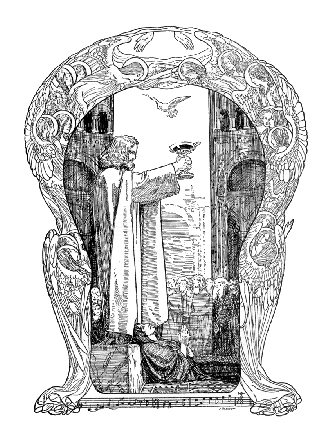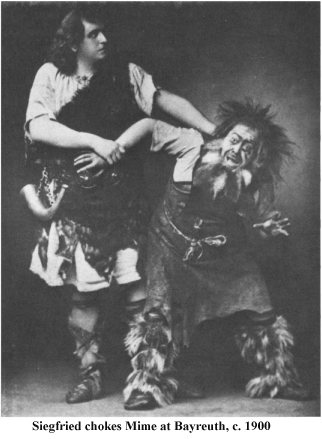Wagner and the heroic ideal
Wagner's "new mythology" created, especially in his later works, a world and culture unto itself. In his music were political, social, ethnic, and gender theories; all pointing toward a certain type of Man. His music dramas focus their attentions on heroic men, propped up as examples for all men (Niekirk 2004, 190). Their deeds, quests, and also musical motives create a mystical aura around the masculine, commanding figure. Scholar George Mosse would claim that this "creates a countertype" that is both racially degenerate and effeminate (1996, 60).
Wagner chooses to code his heroes using "strong" musical gestures, like the ascending arpeggio signifying Siegfried. These motives resemble typically masculine tropes often employed in earlier music--horncalls for hunters and warriors. His heroes (and heroines) exhibit qualities of piety, devotion, and a strange affinity for self-sacrifice and even death. They often seek somewhat phallic relics--the sword Nothung in Des Ring der Nibelungen and the Holy Grail in Parsifal--and once possessed of these items are imbued with superhuman capabilities (Niekirk, 192). Characters like Tristan, Siegfried, Wotan, and Parsifal are images of Wagner's ideal man. Parsifal reaches such a high level that he is accorded with an almost divine bearing--often cast to resemble traditional representations of Christ. |
 |
 |
The anti-hero as anti-human
Away from this strong, masculine archetype is the anti-hero, Mime, in Siegfried. Rather than engage in acts of sacrifice and quests for fulfillment, this character plays some all-too-familiar roles. His brother forged the ring and armor for which Siegfried searches and, throughout the cycle, Mime engages in cunning and trickery, only to be foiled by Wotan and Siegfried. Mime's ultimate goal is to retake the ring and its great power with it.
In his greed, skullduggery, and penchant for jewelry, Mime represents both an archetypal anti-hero and a caricatured portrayal of Wagner's Jew. He is weak both in mind and body--thoroughly unheroic. Rather than being able to create, he can only mimic heroes and their musical gestures. This is what a man should not be. It in was this character that Mahler saw himself and his "type." Through the lens of Wagnerian drama, Mahler was the perfect Mime--he fit both the physical and ethnic types--and Mahler knew that well: |
"Ich weiss nur einen Mime (wir sahen gespannt auf ihn): und der bin ich!" (Bauer-Lechner 1980, 122)
In English: "I know only one Mime (we were fixed on him): and I am he!"

